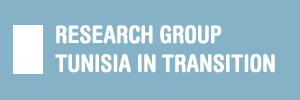The research group “Tunisia in Transition” strives to refine the academic skills of its members, in particular in view of its interdisciplinary approach. It has the ambition to sharpen the methodical thinking of young academics and to provide them with a tool-kit they can use for their own research. Against this background, a methods workshop took place at La Manouba University in June 2013. The intensive class, which was attended by a dozen Tunisian and several German young academics, was divided into three parts. Research methods in Applied Political Science, International Relations, and Communication Studies were taught.
The first part featured Dr. Reinhardt Rummel, a Senior Scholar at the University of Munich’s think tank “Center for Applied Policy Research” (CAP). Mr. Rummel, who has also served at the Berlin-based think tank “German Institute for International and Security Affairs” (SWP), shared his experience on how to develop a research project that is of interest for the political milieu. Whilst elaborating on the working procedures in Think Tanks, he stressed the importance of group work and of an internal and external review process. In addition, he underlined the necessity of the dissemination of research results. Ideally, one should already know the target group at the beginning of a research project.
In the second part Prof. Dr. Bernhard Stahl, who holds the Chair for International Relations at Passau University, provided an introduction on how to use “discourse analysis” in the context of the study of international politics. By employing the example of German foreign policy and military intervention in Afghanistan, Somalia and Libya, Mr. Stahl explained the necessary tools, including how to define a text corpus, to perform a coherent analysis of the political discourse. In the interactive part of the session, Mr. Stahl together with Mr. Ratka, who works at his Chair, and the young academics carried out an own discourse analysis on the Tunisian public opinion on intervening in the Syrian crisis with the young academics.
The last part of the seminar was dedicated to the topic of interviews in social sciences. This session was taught by Prof. Dr. Oliver Hahn, who holds the Chair of Journalism at the University of Passau. In the beginning of the session Mr. Hahn gave the young academics an overview of the different kinds of interviews, such as structured, semi-structured and narrative interviews. Mr. Hahn stressed the importance of interviews as a technique to gather important information. In the second part he advised the young researchers to choose their interview partners wisely and emphasized that the best place to find possible interviewees is the “middle management”, be it in a company, governmental department or within social movements. Mr. Hahn also warned the fellows to be cautious with their questions so as not to influence the answers of the interview partners. Finally, he stressed the necessity of “scientific traceability” of information gathered through interviews and discussed several techniques such as recording and coding.
All three sessions led to numerous questions and lively discussions between the research fellows and the experts and among the young academics themselves. In the end, the participants stressed once more the importance of such seminars on methodology and research techniques and underlined the need for more such activities.
